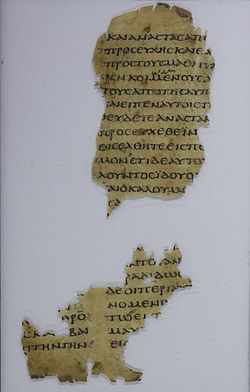| Change to Book/Chapter View |
|
|
|
Translation process is ongoing. For current status see details |
|
|

Uncial 0171 Date: Late Third or Early Fourth Century A.D. Discovered: Hermapolis Magna, Egypt Location: Florence, Italy: Biblioteca Medicea Laurenziana Contents: Matthew 10:17-23, 25-32; Luke 22:44-50, 52-56, 61, 63-64
Matthew 10 17 But
beware of men, for they will deliver you up to councils,
and in their synagogues they will scourge you. 18 Yes,
and you will 21 “Brother will deliver up brother to death, and the father his child. Children will rise up against parents and cause them to be put to death. 22 You will be hated by all men for my name’s sake, but he who endures to the end will be saved. 23 But when they persecute you in this city, flee into the next, and if in the next they persecute you, flee to another, for most certainly I tell you, you will not have gone through the cities of Israel until the Son of Man has come. [..] 25 It is enough for the disciple that he be like his teacher, and the servant like his lord. If they have called the master of the house Beelzebul, how much more those of his household! 26 Therefore don’t be afraid of them, for there is nothing covered that will not be revealed, or hidden that will not be known. 27 What I tell you in the darkness, speak in the light; and what you hear whispered in the ear, proclaim on the housetops. 28 Don’t be afraid of those who kill the body, but are not able to kill the soul. Rather, fear him who is able to destroy both soul and body in Gehenna. 29 “Aren’t two sparrows sold for an assarion coin? Not one of them falls to the ground apart from your Father’s will. 30 But the very hairs of your head are all numbered. 31 Therefore don’t be afraid. You are of more value than many sparrows. 32 Everyone therefore who confesses me before men, I will also confess him before my Father who is in heaven. [..]
Luke 22 44 Being in agony he prayed more earnestly. His sweat became like great drops of blood falling down on the ground.[1] 45 When
he rose up from 47 While
he was still speaking, a crowd appeared. He who
was 49 When
those who were around him
saw what was
about to happen, they said to him,
“ [..] 52 Jesus
said to the chief priests, captains of the temple, 54 They seized him, and led him away, and brought him into the high priest’s house. But Peter followed from a distance. 55 When they had kindled a fire in the middle of the courtyard, and had sat down together, Peter sat among them. 56 A certain servant girl saw him as he sat in the light, and looking intently at him, said, “This man also was with him.” [..] 61 The
Lord turned and looked at Peter. Then Peter remembered
the Lord’s word, 63 The men who
held Jesus him mocked him |
How to read these pages: • The
translation to the left is based on the World English Bible. Words in regular
black font are words in the manuscript matching the Majority Text for that
passage. • Words
in italics cannot be seen in the manuscript, since the manuscript is
fragmentary. These words are supplied for readability by the World English
Bible translation. • Words
present in the manuscript but with some letters unreadable or missing are in blue
like this: blue. One Greek word often is
translated into multiple English words, and when this occurs, all the English
words are in blue. • Words
present in the manuscript but with spelling or trivial word order differences that do not affect the
meaning are in green like this: green. • If
the manuscript is different from the Majority Text, words in the Majority
Text that are missing from the text of the manuscript are marked through in red
like this: • If the manuscript is different from the Majority Text, words in the manuscript that are not in the Majority Text are underlined in red like this: new words.If the manuscript differs from the Majority Text yet matches another well-known text, this is noted in the footnotes.
|
